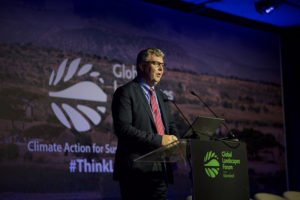
By Peter Holmgren, originally published on CIFOR’s Forests News
The Center for International Forestry Research (CIFOR) welcomes the ratification and early entry into force of the Paris Agreement. This is a major step towards effective global climate action. We also welcome the recent progress on REDD+ results based payments at the Green Climate Fund.
The land sector will be key in achieving the well below 2 or 1.5 degree goal agreed in Paris and this is clearly reflected in the long term goal of net zero emissions, Article 5 and the Preamble of the Agreement. This role however is not limited to that of forests or agriculture in isolation, but across the landscape. It will be the actions that are taken on the ground by smallholder farmers, local communities, small to medium business and other non-state as well as State actors that will drive the outcomes concerning climate. Climate mitigation and adaptation will inevitably be a co benefit of the actions taken across the landscape.
We urge world leaders to emphasize integrated solutions that harness ecosystem services derived from intact, productive and adaptive landscapes, and to move away from the business-as-usual rhetoric of forest (or ecosystem) conversion for development. Integrating these objectives harmoniously in a complex world requires approaches that are based in science, are socially, culturally and environmentally responsible, and take the needs of all stakeholders into account through open, fair and equitable participation, and that are rooted in recognition of rights.

Our experience studying REDD+ over 6 years shows that there are no lasting climate solutions involving tropical forests if the livelihoods of the people in those forests are not sustained or improved – global environmental sustainability requires local economic sustainability. While action at the international level is important, international climate action meets the requirements of the world’s forest dependent communities when implemented on the ground.
Turning to the negotiations in Marrakesh, we are concerned that the international climate community was unable to come to an agreement on concrete next steps related to the agriculture agenda item. It is essential that moving forward, to implement the Paris Agreement and achieve the much needed transformational change, an approach that addresses agriculture as a major driver of deforestation, whilst putting in place measures at the international level to ensure food security and protect rights will be essential.
We welcome the road map that has been agreed in Marrakesh as an important step forward in terms of developing the rule-book to ensure the Paris Agreement is implemented. We hope to see the completion of this important work by 2018, in particular on topics concerning accounting for nationally determined contributions, adaptation communications, transparency and compliance. We hope this work will encourage parties to put in place the much-needed steps to increase their ambition. In this work, world leaders should place importance on the use of science and evidence as key to assessing and monitoring the performance of NDCs in policy and practice, across multiple sectors and levels of government.
We encourage countries to revise their NDCs to enhance ambition and address the operationalization of the agreed climate objectives, and doing so within multifunctional landscape objectives, clear strategy plans and actionable roadmaps, unambiguous designation of accountability, and effective participation of all sectors and levels of governments. This will require collaboration with non-state actors (from the corporate sectors to civil society) across those sectors, with enhanced transparency arrangements, while striving to avoid negative social and environmental impacts, especially on smallholder farmers and rural and indigenous communities.











